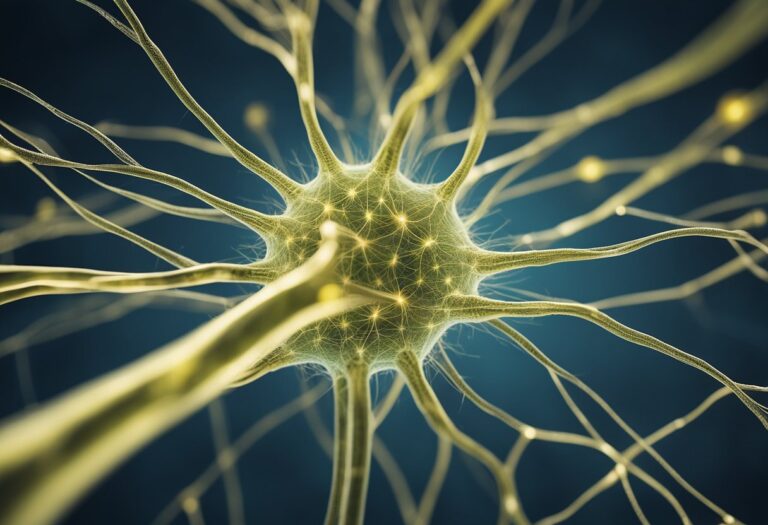Neuropathy refers to a range of medical conditions where nerves in the body’s peripheral system are damaged. This damage can disrupt the normal functioning of the peripheral nerves that connect the brain and spinal cord to muscles, skin, and internal organs. It can manifest in numbness, pain, weakness, and a variety of other symptoms depending on which nerves are affected. The causes of neuropathy are diverse, ranging from genetic factors to environmental exposures.
Diabetes is one of the most common causes of neuropathy; prolonged high blood sugar levels can lead to diabetic neuropathy, affecting a significant number of individuals with diabetes. However, neuropathy can also arise from other sources such as certain infections, inherited disorders, and exposure to toxins. Additionally, physical trauma, repetitive injury, poor nutrition, and certain medications can lead to the development of neuropathic symptoms.
In some cases, the underlying cause of neuropathy may be a complex mix of factors, including systemic diseases that can induce nerve damage. Identifying the exact cause can be crucial for targeting treatment and managing symptoms effectively. Studies have suggested that even obesity may be sufficient to cause neuropathy, independent of diabetes. As ongoing research sheds light on these complex mechanisms, healthcare providers are better equipped to diagnose and treat this multifaceted condition.
Types of Neuropathy
Neuropathy involves damage to the nervous system and can affect various bodily functions. This section examines the structure of the nervous system and the different types of neuropathy.
Neuropathy is classified based on the type of nerves affected:
- Sensory Neuropathy: Impacts sensory nerves, leading to symptoms like numbness, tingling, or pain, especially in the hands and feet.
- Motor Neuropathy: Affects motor nerves, which can result in muscle weakness, cramps, and spasms.
- Autonomic Neuropathy: Influences autonomic nerves, causing alterations in blood pressure, heart rate, and bladder function.
Each type exhibits distinct manifestations and is the result of certain kinds of nerve damage, often linked to underlying health conditions.
Overview of The Nervous System
The nervous system is a complex network of nerves that transmits signals between different parts of the body. It is divided into the central nervous system (CNS), which includes the brain and spinal cord, and the peripheral nervous system (PNS), consisting of all other neural elements. The PNS is further subdivided into sensory nerves, which transmit sensations, motor nerves, which control muscle movements, and autonomic nerves, which regulate involuntary functions like heart rate and digestion.
Common Causes

Neuropathy manifests due to various factors ranging from medical conditions to lifestyle choices. Identifying the specific cause is crucial for effective management of the condition.
Nerve damage, can develop from a range of sources. Some individuals may find their condition is linked to genetic predispositions if there is a family history of nerve-related disorders. In other cases, no identifiable cause is found, which is then classified as idiopathic neuropathy.
Medical Conditions
Several medical conditions can lead to the development of neuropathy. One of the most common conditions associated with it is diabetes, which can result in diabetic neuropathy if blood sugar levels are not well-controlled. Besides diabetes, autoimmune diseases such as lupus or rheumatoid arthritis, infections like shingles or HIV, and various forms of cancer that may require chemotherapy, which itself can cause nerve damage, are notable causes.
Lifestyle and Environmental Factors
Lifestyle choices such as the consumption of alcohol can cause neuropathy due to the toxic effects of alcohol on nerve tissues. Exposure to toxins, including heavy metals and industrial chemicals, can also contribute to nerve damage. Additionally, certain medications, beyond chemotherapy agents, have been known to induce neuropathy. It’s important for individuals to recognize that both age and lifestyle can significantly affect their nerve health.
Symptoms of Neuropathy
Neuropathy presents with a range of symptoms that affect sensory, motor, and autonomic functions. The nature of symptoms can vary greatly depending on the type and severity of the neuropathy.
Sensory Symptoms
Patients with neuropathy often experience changes in sensation. Common sensory symptoms include tingling, numbness, and pain that can manifest in the hands and feet. These sensations may also be described as a burning or freezing pain. Sensitivity to touch can be heightened or diminished, leading to issues with balance and coordination. The loss of sensation can make it difficult to detect changes in temperature or perceive subtle pressure changes, leaving patients vulnerable to injuries.
Motor Symptoms
Neuropathy can lead to muscle weakness, impacting the patients’ ability to perform everyday tasks. Muscle weakness is often more pronounced in the muscles further from the center of the body, such as those in the hands and feet. This can contribute to a lack of dexterity and coordination, affecting the ability to grasp objects, walk, or maintain balance.
Autonomic Symptoms
The autonomic symptoms of neuropathy affect the body’s involuntary functions. Patients may notice abnormal sweating or an inability to control body temperature. Gastrointestinal issues such as constipation and diarrhea can occur, along with bladder dysfunction that leads to urinary retention or incontinence. Cardiovascular symptoms like lightheadedness or dizziness upon standing can be indicative of changes in blood pressure regulation.
How Is Neuropathy Diagnosed?
To accurately diagnose neuropathy and understand its causes, medical professionals utilize a combination of clinical evaluations, electrophysiological tests, and various laboratory tests. Each approach plays a crucial role in pinpointing the type of nerve damage and underlying conditions.
Clinical Evaluation
A clinical evaluation of neuropathy begins with a thorough medical history and physical examination. This step is crucial as it helps in assessing symptoms and identifying potential causes. Healthcare providers inquire about the patient’s symptoms, such as numbness or tingling, and look for physical signs of nervous system damage. This initial review can lead to a more targeted diagnostic pathway.
Electrophysiological Testing
Electrophysiological testing involves procedures like electromyography (EMG) and nerve conduction studies. These tests measure the electrical activity of muscles and the speed of nerve signal conduction, providing data on the functioning of the patient’s nervous system. Abnormal results can indicate the presence of nerve damage or neuropathy, aiding in differentiating between various types of nerve disorders.
Laboratory Tests
The suite of laboratory tests for neuropathy often includes blood tests to rule out vitamin deficiencies, diabetes, and other metabolic or systemic causes. Additional tests, like those of skin or muscle tissue, can reveal small fiber neuropathy or other specific types of nerve damage. These tests are essential to exclude or confirm underlying conditions that could be contributing to the patient’s neuropathy symptoms.
How To Manage The Severity Of Neuropathy
Effective management of neuropathy involves a multifaceted approach that addresses lifestyle modifications and appropriate medications and treatments to relieve pain and improve quality of life.
Lifestyle Modifications
A significant part of managing neuropathic symptoms involves adopting healthy lifestyle choices. This includes:
- Regular Exercise: Engaging in regular physical activity can enhance muscle strength and reduce neuropathy pain. Care should be taken to avoid exercises that may exacerbate the condition.
- Balanced Diet: Maintaining a diet rich in nutrients can support nerve health. Essential vitamins and minerals aid in managing neuropathy.
- Avoiding Harmful Substances: Limiting alcohol consumption and avoiding tobacco can lessen the risk of worsening neuropathic symptoms.
Additionally, for those with neuropathies linked to diabetes, it is crucial to maintain proper glucose levels to prevent further nerve damage.
Medications and Treatments
The treatment of neuropathy may involve a variety of medications and therapies designed to manage pain and improve sensation. These may include:
- Pain Relievers: Over-the-counter options are available, but for more severe pain, prescription pain relievers may be suggested.
- Antidepressants: Certain antidepressants can relieve pain by altering chemical processes in the brain that cause you to feel pain.
- Anti-Seizure Medications: Drugs such as gabapentin, pregabalin, and other medications designed for epilepsy may be effective in reducing nerve pain.
- Topical Treatments: Topical lidocaine patches can target pain without the systemic side effects of drugs taken by mouth.
For neuropathic pain unresponsive to medication, treatments may include:
- Physical Therapy: Physical therapy can help maintain muscle strength and reduce pain.
- Surgery: If neuropathy is caused by pressure from tumors or other abnormalities, surgery may be necessary to address the underlying issue.
Common Complications
Neuropathy can lead to various complications due to the damage in peripheral nerves affecting muscle movement, sensation, and organ function. The severity of these complications often depends on the extent and type of nerve damage.
Progressive Symptoms
Neuropathy’s progression can result in significant complications. Impaired nerve function can lead to involuntary muscle weakness, affecting coordination and balance. This muscular deterioration primarily impacts the feet and hands, often reducing the patient’s ability to perform basic tasks. A specific concern is the inability to feel pain, which, when combined with a reduction in skin sensitivity, can lead to unnoticed burns or skin injuries, especially on the feet.
Secondary Injuries
Due to the loss of sensation, patients with neuropathy may not detect minor injuries, leading to serious secondary complications. For instance, small cuts or blisters on the feet may escalate into serious skin ulcers without proper detection and care. Similarly, weakened muscle movement can result in falls and fractures. Gastrointestinal complications arise when nerves affecting digestion are damaged, leading to conditions such as gastroparesis. This can disrupt not only digestion but also bowel function, further complicating the patient’s health and well-being.
Frequently Asked Questions
What is the most common cause of neuropathy?
Diabetes is the foremost cause of neuropathy in the United States. It specifically leads to the onset of diabetic peripheral neuropathy due to high blood sugar damaging nerves, primarily in the legs and feet.
What triggers neuropathy to flare up?
Neuropathy flare-ups can be triggered by factors such as poor glycemic control in diabetics, physical injury to nerves, infections, or pressure on nerves. Additionally, stress and certain medications can exacerbate neuropathic pain.
What are 3 symptoms of neuropathy?
Three common symptoms of neuropathy include numbness or tingling in the hands and feet, sharp, jabbing, or burning pain, and muscle weakness. This condition may also lead to sensitivity to touch or changes in skin, hair, or nail appearance.
How can neuropathy in the feet be treated?
Treatment often involves managing the underlying condition, such as controlling blood sugar in diabetes, and may include pain relief through medications, physical therapy, or the use of transcutaneous electrical nerve stimulation (TENS). Sometimes peripheral neuropathy recommendations also encompass lifestyle changes and foot care.
Are there different types of neuropathy to be aware of?
Yes, there are several types of neuropathy, including peripheral neuropathy, which affects extremities, autonomic neuropathy impacting internal organs, proximal neuropathy causing pain in thighs and hips, and focal neuropathy affecting a single nerve, usually on the hand, head, torso, or leg.
Can peripheral neuropathy lead to life-threatening conditions?
While peripheral neuropathy itself is not usually life-threatening, it can lead to complications that increase the risk of injury, infections, and may exacerbate other conditions affecting the cardiac or respiratory systems, stressing the importance of effective neuropathy management.





